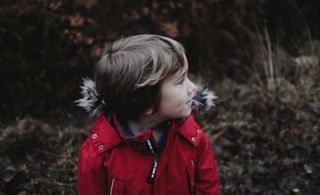Introversion
What Are Introverts Like as Children?: 7 Characteristics
Introverted kids share these seven traits.
Posted April 19, 2019 Reviewed by Lybi Ma
Key points
- Whether someone is an introvert or an extrovert is determined in large part by genetics, and tends to remain stable over time.
- Children may start to display introverted tendencies as early as 4 months of age.
- In a culture that praises extroversion, it's important for parents and other adults to recognize introverted children's strengths and challenges.
- Introverted children often have a rich interior world. But they may struggle in social settings, and can appear overly hesitant or cautious.

As an introverted child, I lived partly in a small suburb in Minnesota and partly in my imagination. I was content spending whole afternoons by myself, writing books on construction paper and daydreaming. As a teenager, I had a group of friends I loved, but spending time with them drained me. They didn’t seem to need the alone time that I required just to function. I told myself that they were the “normal” ones, and I should be more like them.
Later in life, I learned there’s a word for who I am—introvert. By definition, introverts get easily drained by socializing and need plenty of downtime. Most important, there’s absolutely nothing wrong with being an introvert. It’s not a disease or a disorder. In fact, 30 to 50 percent of the population are introverts, which means there are plenty of us "quiet ones" out there!
Being an introvert is something that will never change about me. Yes, we can grow and stretch as people; we can step out of our comfort zones, develop new skills, or gain a new perspective on life. But our temperament (introversion or extroversion) is in large part innate. Experts agree it's something we’re born with, and it remains largely stable throughout our lives. According to Dr. Marti Olsen Laney in The Hidden Gifts of the Introverted Child, kids begin showing signs of introversion or extroversion around four months of age—and they generally remain true to their nature as adults.
In other words, once an introvert, always an introvert.
So what are introverts like as kids? No two introverts are exactly alike, but introverted children tend to share these seven characteristics to some degree.
7 Characteristics of Introverted Children
1. They have a vivid inner world.
It’s always alive and present for them. They rely on their inner resources rather than constantly turning to other people for support and guidance. “In their private garden away from the material world, they concentrate and puzzle out complex and intricate thoughts and feelings,” writes Laney.
Introverted children like imaginative play, and they prefer playing alone or with just one or two other children. They often spend time in their own room with the door closed, doing solitary things like reading, drawing, or playing computer games.
Unfortunately, having a rich inner world can be a double-edged sword, because it can lead them to feel isolated and alienated from others. It’s important for parents of introverted children to help them see how their temperament can be a source of strength.
2. They engage with the deeper aspects of life.
Introverted children are not afraid of the big questions. They want to know why something is the way it is or what it means on a deeper level. Astonishingly, even at a young age, many of them can step outside themselves and reflect on their own behavior. Often, introverted children want to understand themselves—and everyone and everything around them. They might wonder, what makes this person tick?
3. They observe first, act later.
Generally, they prefer to watch games or activities before joining in. Sometimes appearing hesitant and cautious, they stand back from the action and enter new situations slowly. They may be more energetic and talkative at home, where they feel more comfortable.
4. They make decisions based on their own values.
Their thoughts and feelings anchor them inwardly, so they make decisions based on their own standards rather than following the crowd. This can be an extremely positive aspect of their nature, because it means they’re less vulnerable to peer pressure. They don’t do things just to fit in.
5. It can take time for their real personalities to come out.
Just like introverted adults, introverted kids warm up to new people slowly. They may be quiet and reserved when you first meet them, but as they become more comfortable with you, they come alive. Often their aim in conversation is to better understand their own or someone else’s inner world; they value connecting and really getting to know someone on a deeper level.
Like introverted adults, introverted kids are generally good listeners, paying attention and remembering what the other person says. They may speak softly, occasionally pause to search for words, and stop talking if interrupted. They may look away when speaking to gather their thoughts, but make eye contact when listening.
6. They struggle in group settings.
Over the years, our society’s values have shifted, and extroversion has become the ideal. We praise assertiveness, group acceptance, and external accomplishment, rather than quiet reflection, solitude, and careful decision-making.
Sadly, the standards of being outgoing and assertive have been woven into every school and institution that an introverted child encounters. At a younger and younger age, children are spending time in group day-cares and preschools. When they begin formal schooling, they may spend 6-7 hours a day with up to 30 other children, all the while being encouraged to participate and work in groups. This is challenging for introverts, who do better at home during their early years and adapt better to group settings as they grow older, writes Laney.
7. They socialize differently than extroverts.
They may have just one or two close friends and count everyone else as an acquaintance, because introverts seek depth in relationships rather than breadth. They probably won’t spend as much time socializing as extroverted kids, and they’ll need to go off on their own after a while to recharge their energy. Like introverted adults, introverted kids have limited social energy. Too much time spent socializing might result in tears, meltdowns, and bad moods.
Introverted vs. Extroverted Children
How do introverted kids compare to extroverted kids? Here are some general characteristics of extroverted children, from Laney’s book. Extroverted kids may:
- Talk with a snappy patter and loud voice, even more so if nervous
- Switch subjects frequently
- Have the capacity to sound like an expert on a subject, even when they're not
- Stand close to the person they’re talking to
- Interrupt conversations
- Look away when listening
- Be very expressive with their face, hands, or body when talking
- Get bored and disengage if a conversation goes on for too long
- Think of most people as friends
- Dive into new situations quickly
- Feel charged up after stimulating activities—especially social ones
- Complain or feel drained if they spend too much time alone
If you’re the parent of an introverted child, the best thing you can do for your child is to honor their temperament. Help your child understand why they feel tired and cranky after socializing. Teach them that there's nothing wrong with needing to spend time alone.
Above all, don’t ever let them think there’s something wrong with them because they’re introverted. When we embrace introverted kids for who they are, we give them the confidence they need to fully show up in the world.
Facebook/LinkedIn Image Credit: Soloviova Liudmyla/Shutterstock




